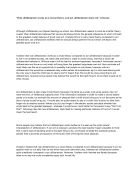A LOOK INTO THE LIFE AND WORKS OF SAMUEL JOHNSON
Samuel Johnson, a prominent English writer of the early eighteenth century, brought vivid life to the literary realm of that era. He is known by many to be a writer of great intellect, thought, and positive influence in the writings of literary to follow. Johnson has been hailed as a literary giant in his day, as well as in present times. Samuel Johnson is a great writer because of the critical approval of specific elements, namely satire, the moral romance, and the biography.
The first element for which the critics have praised Johnson is his powerful satire. Johnson’s best example of this is displayed in his work The Vanity of Human Wishes. In this highly regarded poem, Johnson intertwines moral elegance and majestic verse in this satirical masterpiece. The Vanity of Human Wishes is hailed as one of Johnson’s greatest literary accomplishments. This wonderful work illustrates, according to Albert Perry Walker in his book Life of Johnson, “The futility of man’s ambitious struggles for happiness...”1 Samuel Johnson had a keen sense of his surroundings, as he was a common figure in English society. Johnson did not, however, begin his life in a stately position within the class system. He grew up beneath the weights of poverty as his family struggled to make ends meet. Determined to get the best education possible, Samuel Johnson worked hard to earn his acceptance into Oxford where he eventually received his degree from. A decade or so upon graduating from the university, Johnson compiled the satirical poem, The Vanity of Human Wishes, which keenly expounds on his tragic yet comical view on life. Despite growing up in poverty and the unfortunate death of his wife, Johnson sees life as a cherished gift that should not be taken for granted. In The Vanity of Human Wishes, Johnson clearly expounds on his views toward life using well-embodied satire.







